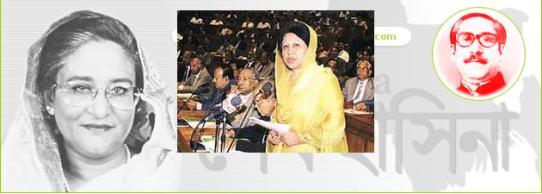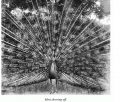Khaleda’s chargesheet against Hasina

By M RAMA RAO
New Delhi (Syndicate Features): Bangladesh is again warming up for a bitter war of words between the two begums who have been dominating the political scene for over a decade. Significantly their political fortunes also keep alternating every four-five years. Now it is the turn of Sheikh Hasina to head the coalition government in Dhaka. Her party won a massive mandate at the head of a Grand Alliance of parties opposed to Khaleda Zia’s Bangladesh Nationalist Party (BNP). Though her party was routed in the elections held in December 2008, Khaleda had won her seat but she has not attended Parliament even for a single day. She gave a go-by even to parliamentary committees, which, like in India, conduct serious legislative business.
Unlike Hasina and her family, Begum Khaleda was no where on the political scene at the time of liberation war. Her husband was a major in the Pakistan army. Zia-ur-Rehman, who went on to become the army chief and head of the country, was among several voices that read the proclamation of independence over the East Pakistan Radio (EPR). This is enough for Khaleda to shine in the reflex glory of the ‘rich’ liberation legacy. And she is using every conceivable occasion to shred the Hasina government into pieces. In fact she used the 39th anniversary of liberation of Bangladesh on March 29 to launch her chargesheet against the Awami League leader. Incidentally the occasion marked by a rally in Dhaka, was also Khaleda’s first public appearance after Grand Alliance’s came to office in January 2009
What are Khaleda’s charges against Hasina, of a former prime minister against the present prime minister? The BNP leader claims that the Awami government is untrustworthy, tells lies, targets political opponents and slaps cases against them. “It (government) is super efficient in signing agreements but absolutely inefficient in implementing the promises. The second most serious charge is that the Hasina government stinks in corruption and that Bangladesh’s future and independence are not safe in AL hand. According to the BNP supremo, who is embroiled in several corruption cases, some ambitious Army officers, notably, former Army chief Gen Moeen u Ahmed are the real force behind the Awami throne. She holds the view that these very officers and the then Chief Adviser to Caretaker Government Fakhruddin Ahmed had helped Awami League to wear the electoral crown. Why did they do so? ‘Only to keep my party out of power’, claims Khaleda
The Khaleda chargesheet makes the mandatory reference to India. It says Prime Minister Hasina, during her India visit (at the beginning of 2010), handed over Chittagong, and Mongla ports and a corridor to India. Since these allegations were made by a person who was a former prime minister herself, there is need to closely examine her chargesheet. Hurtling counter-charges at her and her family as some of the ruling alliance leaders appear to have done is neither fair nor proper for a healthy political discourse, which Bangladesh badly needs.
A caveat will be in order though. One the AL coalition, by the force of circumstances, has to deal with priority national issues with controlled aggression. Two Prime Minister Hasina and her colleagues came to power on the promise of trying war criminals, terrorists and corruption-syndicates that had been enjoying patronage in the country. Court cases against some of Khaleda Zia’s associates are a corollary to the mandate. But these ‘victims’ are in turn making wild allegations which have invited defamation suits against them.
In recent months Bangladesh signed some milestone agreements and initiated MoUs with two regional powers – India and China. Ground has been created to resolve many long outstanding issues and improve relations with neighbours, particularly India. As a small country, Bangladesh, can not afford to keep its doors and windows closed for ever.
Hasina is accountable to parliament for all her actions. If Khaleda really feels so strongly against the Hasina government, the right forum for her to articulate her concerns is the floor of Parliament. It is also the right place where all concerns and charges should be backed by credible supporting evidence. But Khaleda does not attend parliament or its standing committees. The question is why the leader of the main opposition in the country didn’t come forward to substantiate her critique of the prime minister? It could be because she has no evidence to substantiate. Or because she doesn’t have respect to Parliament as the House of the People, where the government of the day in a democracy is made to answer for all its acts of commission and omission to the satisfaction of the people. Or it could be because of a combination of both factors. Whatever be this big if, the end result is same.
Prime Minister Hasina did not open up Chittagong and Mongla ports to India alone. The facility is extended to Nepal, Bhutan and China. This was not done behind the back of Parliament. It was an act aimed to secure the economic interests of the nation as never before. With more imports and exports through these two ports, Bangladesh economy stands to get tremendous boost. Another decision of Hasina which has drawn the ire of her bete noire is joining the proposed Asian Highway Network. During her time in office, Khaleda steadfastly refused to sign the UN brokered agreement on the 140,000 km road network. Her decision was based on a myopic vision – the network would ultimately help India gain transit facility through Bangladesh to reach its north-eastern states, which are presently connected to the mainland by a narrow strip known as the Chicken’s neck at Siliguri.
So, the BNP and its allies have reason to be angry with AL and its allies. Unlike them, Hasina and her colleagues did not see the Asian Highway through the tinted India Prism. In their considered view, the highway connecting 38 Asian countries and linking them with Europe through Turkey will open up tremendous opportunities for trade and commerce. It will also take Bangladesh closer to Europe which is the main destination for the garment exports. More over, Bangladesh would also get the economic benefits of having ‘Trans Asian Railways’.
Now to the criticism that Gen Moeen and some other senior army officers helped the Awami League to come to power and are reaping the benefits. There is absolutely no doubt that Gen Moeen and his colleagues backed the caretaker government and helped in the conduct of general elections. Equally true is the fact that this very group of army officers was benefited largely from Khaleda rule.
Consider the facts. Almost towards the fag-end of her second term as Prime Minister, Khaleda Zia named Gen Moeen U Ahmed as the army chief superseding many senior to him. She owes the nation an explanation why she had picked Gen Moeen bypassing the seniority list. Today she may not like to remember but she ensured that her close relative Gen Mashududdin Chowdhury had a key position in the caretaker government.
But it is her hard luck that these ‘favoured generals’, who were handpicked for top jobs undid her carefully laid re-election plans by ensuring the neutrality of the army. Had Khaleda had her way, the country could have plunged into a civil war with the opposition not accepting the verdict. The international community hailed the December 2008 election as the most free and fair ballot. All right-thinking Bangladeshis also agree with this assessment.
As stated at the outset Khaleda Zia’s charge of corruption against Hasina must be investigated. If the allegations are unsubstantiated, the former prime minister in all fairness must apologise publicly. People have seen how the so-called ‘Islamic nationalism’ propounded by BNP and its ally Jamaat-e-Islami was used as a garb for one of the worst form of corruption in the country. Khaleda’s two sons became extra-constitutional authorities, ran the government, created a virtual mayhem, and siphoned off hundreds of millions of dollars.
Who announced on the radio the liberation of Bangladesh? This is not a brain teaser; there is enough evidence to show who made the announcement. Khaleda claims that her husband, Zia made the proclamation over the radio. ‘Since Sheikh Mujibur Rahman was held in a Pakistani prison, my husband made the historic announcement’, she says.
Without getting into a slanging match, it is essential to point out that Mujibur Rahman and Zia-ur-Rehman are not in the same league. In fact, after the historic Mujib speech of 7th March 1971 there was nothing left to formally announce the commencement of liberation war. The then East Pakistan Radio (EPR) broadcast Bangabandhu’s declaration of independence from midnight of 25th March, 1971. Several leaders, big and small, read the declaration through out March 26th on behalf of the Bangabandhu. To his credit it must be said, Gen Zia never claimed credit for announcing the start of liberation war. Instead, he had publicly stated that he did it on behalf of the Bangabandhu.
Khaleda’s rule marked an upswing in the fortunes and reach of terrorists local and international. In her Laldighi Maidan address she did not touch upon the subject – how and why terrorists of all hues made Bangladesh a safe haven during her regime, how so many Pakistani and Indian terrorist organisations found shelter in Bangladesh to run operations against India with impunity. She is yet to say a word explaining why her government could not smoke out the terrorists who had killed senior leaders like ASMS Kibria, Ahsanullah Master, Ivy Rahman and some noted journalists.
Bangladeshis expect Khaleda to focus on her government’s failure with the same zeal with which she is targeting the present government. Alas, introspection is not her fort. Otherwise, she would have at least spoken about her failure to track down terrorists who had made an assassination bid on Hasina on August 21, 2004. Also about why sent the sensational Chittagong arms seizure case to the cold storage? People of Bangladesh want an answer to these questions. To another question as well. It is that why her government could not explore and exploit natural resources or set up power plants to meet the country’s growing energy crisis. It is this failure of her government that is responsible for the power, water and gas crisis staring at the country today.
Khaleda’s chargesheet against the Hasina Government is, in fact, a veiled attempt to put spokes in the trial of her long- term allies – the war criminals of 1971. She has been a supporter and well wisher of the well known war criminals and Pakistani collaborators with whom she had earlier shared power.
During her tenure as Prime Minister she did everything possible to thwart any move seeking trial of either the Mujib killers or the war criminals. The former prime minister knows today people want to see the war criminals, anti-liberation elements and Pakistani collaborators brought to justice. She, therefore, cannot afford to openly defend the anti-liberation forces and thus run the risk of antagonizing the people. Hence the subterfuge. The nation is not short sighted; the vision of the people is not blurred. Khaleda Zia must stop stooping low. Neither spreading canards nor spewing venom is a time tested political tool. Either use or overuse will boomerang on the practioners. (Syndicate Features)
-
Book Shelf
-
 Book Review
DESTINY OF A DYSFUNCTIONAL NUCLEAR STATE
Book Review
DESTINY OF A DYSFUNCTIONAL NUCLEAR STATE
- Book ReviewChina FO Presser Where is the fountainhead of jihad?
- Book ReviewNews Pak Syndrome bedevils Indo-Bangla ties
- Book Review Understanding Vedic Equality….: Book Review
- Book Review Buddhism Made Easy: Book Review
- Book ReviewNews Elegant Summary Of Krishnamurti’s teachings
- Book Review Review: Perspectives: The Timeless Way of Wisdom
- Book ReviewNews Rituals too a world of Rhythm
- Book Review Marx After Marxism
- Book Review John Updike’s Terrorist – a review
-
-
Recent Top Post
-
 CommentariesTop Story
India’s Migration Dilemma
CommentariesTop Story
India’s Migration Dilemma
-
 Commentaries
Crowd Management Blues
Commentaries
Crowd Management Blues
-
 Meher Baba SpeaksNews
Meher Baba Loved Them Too…
Meher Baba SpeaksNews
Meher Baba Loved Them Too…
- Commentaries Record Pentagon spending bill and America’s hidden nuclear rearmament
-
 CommentariesNews
Ides of trade between India and Pakistan
CommentariesNews
Ides of trade between India and Pakistan
-
 Commentaries
How sustainable is the rhetoric of India-China Bhai-Bhai
Commentaries
How sustainable is the rhetoric of India-China Bhai-Bhai
-
 CommentariesTop Story
New Set of Diplomatic Strains with Canada
CommentariesTop Story
New Set of Diplomatic Strains with Canada
-
 News
Ratan Tata’s Legacy
News
Ratan Tata’s Legacy
-
 Commentaries
India’s Strategic Push on the World Stage
Commentaries
India’s Strategic Push on the World Stage
- Commentaries Veils of Resistance
-
AdSense code
















